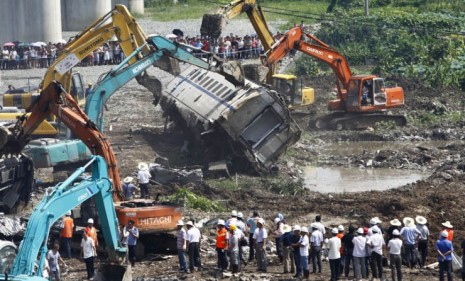Why China needs a recession
China's growth-at-any-cost strategy has led to an unnaturally perky economy, says Peter Stein in The Wall Street Journal. But the consequences could be dire

A free daily email with the biggest news stories of the day – and the best features from TheWeek.com
You are now subscribed
Your newsletter sign-up was successful
A recent collision between high-speed trains in Wenzhou, China, killing 39 people, could prompt China to tap the brakes on its booming economy, says Peter Stein in The Wall Street Journal. In their fervor to stave off unemployment and the social unrest that accompanies it, Chinese officials have been laser-focused on promoting artificial growth at any cost. But the consequences have included a massive accumulation of local-government debt, corruption, and, in cases like the train crash, tragedy. Here's an excerpt from Stein's argument:
Social frustrations mount and burst into the open when flaws in the state-led growth strategy become public. An outpouring of fury on Chinese websites over the Wenzhou high-speed rail crash on July 23 is a case in point. Railway officials blamed the crash of a high-speed train into the rear of a stalled train on "serious design flaws" in the signaling equipment.... Questions will now inevitably be raised as to whether the project prioritized spending over quality control, with lethal results.
Analysts already anticipate far-reaching consequences. In a report last week, Citigroup wrote that the rail tragedy might prompt the government to slow GDP growth in years to come.... What might benefit China more is a recessionary bust that clears the way for a new boom....
The Week
Escape your echo chamber. Get the facts behind the news, plus analysis from multiple perspectives.

Sign up for The Week's Free Newsletters
From our morning news briefing to a weekly Good News Newsletter, get the best of The Week delivered directly to your inbox.
From our morning news briefing to a weekly Good News Newsletter, get the best of The Week delivered directly to your inbox.
China cleared out some economic deadwood beginning in the late 1990s with the reform of its state-owned enterprises and later entry into the World Trade Organization. But in more than three decades, the country's upward trajectory has been consistent to a fault, heightening the risk that an eventual downturn will prove cataclysmic, not cathartic.
Read the entire story in The Wall Street Journal.
A free daily email with the biggest news stories of the day – and the best features from TheWeek.com
-
 Why is the Trump administration talking about ‘Western civilization’?
Why is the Trump administration talking about ‘Western civilization’?Talking Points Rubio says Europe, US bonded by religion and ancestry
-
 Quentin Deranque: a student’s death energizes the French far right
Quentin Deranque: a student’s death energizes the French far rightIN THE SPOTLIGHT Reactions to the violent killing of an ultraconservative activist offer a glimpse at the culture wars roiling France ahead of next year’s elections
-
 Secured vs. unsecured loans: how do they differ and which is better?
Secured vs. unsecured loans: how do they differ and which is better?the explainer They are distinguished by the level of risk and the inclusion of collateral